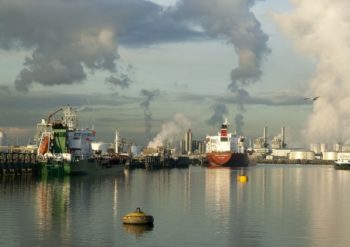
By Jite Eriabie
The Port of Rotterdam has laid out its vision of the future in which it aims to become a zero-emissions port by 2050, according to Remco Neumann the Port Authority’s Corporate Social Responsibility program manager.
“It’s realistic to expect that industry and logistics will be virtually – or by that time, even entirely – zero-emission and silent. We presently recognise that growth in the industrial era has had a number of undesirable side effects. In 2050, there will be no more noise pollution or air pollution and no negative environmental impact. There’s a growing awareness that it is necessary, and indeed possible, to make this transition,” Neumman said.
As explained, despite the fact that currently only 6 percent of the port’s operations are powered by renewable energy, this is set to increase exponentially.
“In the port, you can already find full-electrical container terminals and hybrid vessels, the re-use of residual heat and CO2 and a rapid increase in the use of solar power. The port area already accommodates 1.6 MW of generating capacity. This is expected to increase ten-fold before the end of 2020,” he added.
The Port of Rotterdam Authority endorsed the objectives of the Paris climate agreement and is straining to reduce CO₂ emissions in line with the ambitions of the Dutch and European governments. In concrete terms, this means that that by 2030, the Netherlands – including Rotterdam – will need to have reduced its CO₂ emissions by 49% compared to 1990.
The transition is expected to bring in a major reduction in the transported volume of coal through the port.
The recently-published coalition agreement states that the closure of the Dutch plants needs to be effective by 2030. 15% of the coal that enters the port of Rotterdam is currently destined for coal-fired plants in the Netherlands.
“In view of the announced termination of coal use in the Netherlands’ power plants (instead of a ‘closure of the Dutch coal-fired plants’) and all the projects that the Port Authority is currently working on in partnership with the private sector to reduce the CO2 emissions of Rotterdam’s industrial sector, a 49% reduction of emissions by 2030 (compared to 1990) is considered feasible,” the port authority said.
In a separate announcement, the port authority said that the Municipality of Rotterdam and the Dutch State have reappointed Allard Castelein as CEO of the Port of Rotterdam Authority.
Castelein (59) on the recommendation of the Supervisory Board, and will start his second four-year term as of January 1, 2018.
“I am delighted that in the period ahead, we will be able to continue expanding the implementation of the strategy that we developed as a Port Authority – a strategy we already made a good start on these past few years, together with our many partners and stakeholders. Thanks to digitisation and the energy transition, this is a period of major changes for the port. The Port Authority and the companies established in the port complex need to continue playing an active role when it comes to taking on these challenges for the future,” Castelein said.
Castelein took office as CEO of the Port of Rotterdam Authority on 1 January 2014.
Copyright Ships & Ports Ltd. Permission to use quotations from this article is granted subject to appropriate credit given to www.shipsandports.com.ng as the source.
